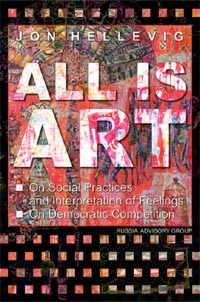|
|
| |
Competitive Justice
I argue that any theory of law, in order to be meaningful, has to deal with the idea of justice (discuss the nature of justice, the shortcomings of justice, and how to develop justice).
When a society is not sufficiently competitively democratic and free, and when all the other competitive constituents in society are not functioning properly then the outcome of justice is unsatisfactory (which is the situation more or less all over the world � any perception of superior justice in the West is only owing to comparisons with places where it is worse). Only individual human beings can lay a claim on justice (naturally animals have to be guaranteed a just treatment).
Whatever is called law deals with the normative expressions and interpretations which interact in producing justice. A comparison of law and justice with medicine and health could be illustrative. Now, I argue that law should be about promoting justice, in the same way as medicine should be about promoting health. The prevalent theories of law can be compared with a notion whereby we would think that health is produced (exclusively) on the surgeons operation desk (i.e. in courts).
Competitive justice is a continuous process going on in all aspects of life all the time between all people. In law proper the two most important constituents of competitive justice are the competition between normative arguments in a court and between normative arguments in politics; the latter resulting in strong normative arguments called statutes (or laws). Both these particular competitive processes function far from perfectly. The basic problem is that there is so little knowledge of the nature of law � the prevailing primitive anthropomorphic conception of law (which I criticize in this book) constitutes an obstacle for freeing the normative competition.
The courts and the �lawmaker� (parliaments and other �sovereigns�) are in a constant competition about the right to issue strong normative arguments (or �make laws� as they say). In the United States this is admitted in legal theory and in practice, while in Europe they want to pretend that this is not the case. This very competition between courts and �lawmakers� is the basis for a well-functioning society and this is the state of affairs any society should aim for. � An honest recognition of this would advance the cause of justice
There is no real separation of powers in the systems of European parliamentarism. � In Europe the legislative and executive branch are in fact one and the same. In the United States, on the contrary, these branches are separated: The President is elected by the people and the government is appointed by the President. - The European brand of parliamentarism leads to a situation which could be called if not monopoly then at least �abuse of dominant market position�, and hence it is a distortion of justice - and a challenge to the fundamental conditions of life, a challenge to life itself. � What we have to do is break up this monopoly.
More important than the division between the executive and the legislative is the separation of powers between the legislative and the judiciary. The normative squeeze caused by the non-competitiveness of parliamentary democracy can be broken only by guaranteeing a truly independent judiciary. The judiciary should be independent to challenge any strong normative arguments issued by the parliament � the fact of the matter is that in many countries even the positive law recognizes this right on the level of constitutions (but the judges are not brave enough to oppose the parliament and the media and render themselves into the service of justice). In the United States the judiciary and the legislator are placed in an open competition.
The true solution is to make the judiciary in reality independent and receiving its mandate from the people, but without any direct elections of the individual judges. A solution of the dilemma between the democratic control and the independency of the judiciary could be accomplished by instituting an elected public judiciary chamber which would not be subordinated to any other authority than the people.
|
|

To download a free pdf file of this book, please click
here
To buy this book, please enter here (www.ruslania.com bookstore)

Click here to download free PDF file

Click here to download free PDF file

Click here to download free PDF file
|

